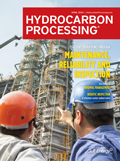
April 2024
Special Focus: Maintenance and Reliability
Residue fluid catalytic cracking (RFCC) is a process that cracks heavy oil into light oil, such as gasoline, with zeolite catalysts.
Effective and efficient insulation solutions remain paramount for the chemical process, oil and gas, and petrochemical sectors.
The ethylene cracker plays a crucial role in the petrochemical industry, producing more than 200 MMtpy of ethylene globally, which is the major building block for plastics, synthetic rubber, lubricants and various chemicals.
The maintenance of industrial chemical plants is essential to protect and restore equipment, circuits and systems to enhance their function and provide efficient operations.
Process Optimization
Many corporations are moving toward sustainable operations for their processes. One alternative pathway to reduce fossil fuels consumption in a processing plant is through harvesting waste heat from industrial waste through combined heat and power (CHP), or what is commonly known as cogeneration or polygeneration.
Due to the ongoing transition to a low-carbon energy system, refiners must produce less fuel oil. Among the technologies used for the commercial-scale hydroconversion of the heavy fraction of crude oil, the use of bubble column upflow reactors with slurry catalyst (slurry technology) does not produce fuel oil.
Petrochemical Technologies
With the continuous progression of environmental regulations and product quality requirements—as well as the increasing market share of new energy vehicles in the context of the carbon peak and carbon neutrality policies—the demand growth rate for refined oil products continues to slow.
Plant Design, Engineering, Construction and Commissioning
Artificial intelligence (AI) in engineering a better tomorrow refers to the concept of utilizing AI technologies to enhance and innovate the field of engineering. This concept includes the integration of AI into various engineering disciplines to improve efficiency, accuracy and innovation.
Digital Technologies
In today’s turbulent global geopolitical and economic landscape, key decision makers at industrial manufacturing organizations are exercising caution when considering new spending. However, despite this moderation, company shareholders expect ever-increasing returns.
Environment and Safety
The 2008 Bayer CropScience pesticide waste tank explosion caused by a chemical runaway reaction at the facility in West Virginia (U.S.) resulted in two fatalities and eight injuries. The U.S. Chemical Safety Board concluded that although a pre-startup safety review (PSSR) was conducted, it was inadequate—operators and subject matter experts (SMEs) were not involved, and an eight-page checklist was filled with a complete disregard to their details and specifics.
Hydrogen
No refinery can operate without hydrogen (H<sub>2</sub>) because it is needed in all hydroprocessing technologies to remove sulfurous impurities and produce products at the correct specifications. With each passing day, the importance of H<sub>2</sub> in refineries is increasing as crude oil gets heavier and more sour while product specifications are simultaneously getting tighter.
Power and Utilities
In an organization’s pursuit of decarbonization, significant opportunities exist in recovering waste heat from high-temperature streams instead of rejecting it to heat sinks. This article analyzes the economics of using the organic Rankine cycle (ORC) to recover waste heat and generate electricity.
Columns
Unit uptime is one of the most important aspects in refining and petrochemical plant operations. Work stoppages due to any number of causes can be detrimental to profitability; therefore, it is imperative to utilize best practices, technologies, techniques and know-how to ensure processing units operate efficiently and safely.
Trends and Resources
After a challenging end to 2022, many in the chemical industry anticipated a modest rebound in production in 2023. However, by mid-2023, several chemical companies significantly lowered their expectations.
Curtiss-Wright’s Actuation Division’s new Exlar Tritex® electric valve actuator (EVA) has achieved CSA Class 1, Div. 2 (C1D2) Hazardous Location certification. It also outperformed U.S. oil and gas producers’ expectations for rugged field test operations in Texas, Oklahoma and New Mexico.
Gulf Energy Information’s Global Energy Infrastructure (GEI) database is tracking more than 1,200 active projects in the hydrocarbon processing industry.

- INEOS receives €300-million grant to rejuvenate and decarbonize its Lavera plant 2/19
- AGC Vinythai commissions expanded chlor-alkali plant and e-BiTAC electrolyzers from thyssenkrupp nucera 2/19
- BASF launches AdBlue GE (green electricity) to decarbonize mobility value chain 2/19
- Carbon Neutral Fuels select Johnson Matthey, bp and Honeywell UOP technologies for UK SAF plant 2/19
- ExxonMobil starts operations on second carbon capture project in Louisiana (U.S.) 2/19
- Pall introduces two new technologies to reduce CAPEX and TCO in oil and gas processing 2/19




